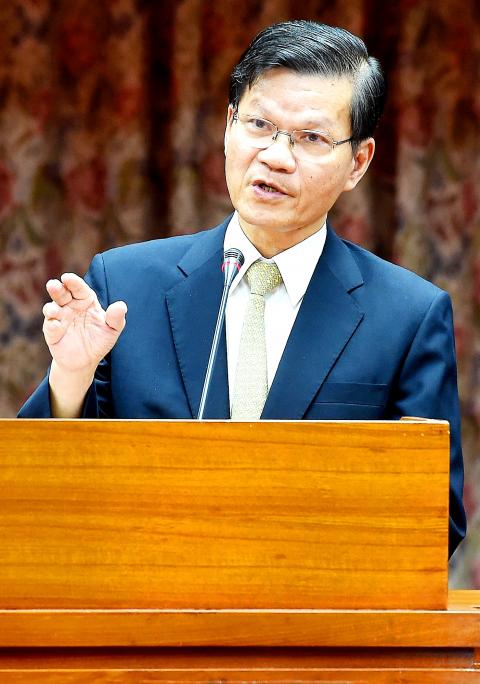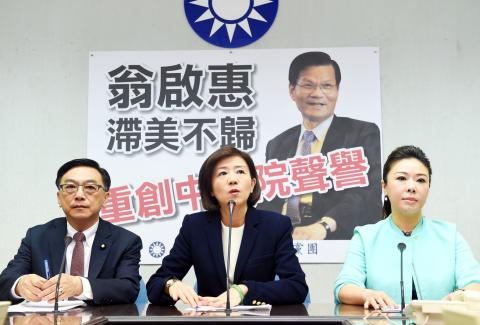A legislative committee yesterday adopted a resolution demanding that Academia Sinica President Wong Chi-huey (翁啟惠) return to Taiwan from the US as soon as possible to clear up a controversy in connection with alleged insider trading of a pharmaceutical company’s shares.
If Wong cannot return to Taiwan immediately, he should submit a written report to the Legislative Yuan’s Education and Culture Committee within one week, the resolution said.
He is required to deliver an oral report to the committee within one week of his return, it added.

Photo: Chu Pei-hsiung, Taipei Times
Wong, who is in the US for academic activities, had earlier said that he would return to Taiwan to attend a hearing on the case scheduled for yesterday.
On Tuesday, he called President Ma Ying-jeou (馬英九) to express his intention to resign from his post as head of the nation’s highest academic institution, citing health reasons, and tendered his written resignation on Wednesday.
Ma rejected Wong’s resignation and instructed him to return to Taiwan as soon as possible to report to him and the legislature, according to Presidential Office spokesman Charles Chen (陳以信).

Photo: Chien Jung-fong, Taipei Times
Academia Sinica is under the direct administrative supervision of the Presidential Office.
The controversy flared up following Wong’s endorsement of a new cancer drug by publicly listed biotech company OBI Pharma Inc (台灣浩鼎), even though the company announced on Feb. 21 that the drug had failed second and third-round clinical trials, news that sent the company’s stock price plunging.
Wong is a biochemist considered to be an expert on the theory behind OBI Pharma’s cancer drug.
On March 3, Wong issued a statement through Academia Sinica that he did not hold any shares in Taiwan’s biotech companies.
However, Next Magazine reported on Wednesday last week that Wong’s daughter, Wong Yu-shioh (翁郁秀), obtained 3 million OBI Pharma shares in 2012 at the price of NT$31 per share before it was listed on the emerging stock market.
The company was listed on the over-the-counter market at NT$310 per share the following year.
The revelation fueled accusations against Wong Chi-huey of a conflict of interests and possible insider trading.
An initial investigation found that Wong Yu-shioh sold more than 10,000 of her OBI Pharma shares three months before the announcement of the cancer drug’s trial failure.
Wong Chi-huey yesterday penned a letter addressed to his Academia Sinica colleagues.
“My personal affairs have lately became the subject of public controversy, with an impact on our institution’s reputation that is profoundly disturbing to me. I am currently abroad and physically indisposed, and I am therefore unable to attend our March 30 report to the Legislative Yuan,” he said in the letter. “I had tendered my resignation to the president and will, upon concluding my affairs abroad, immediately return [to Taiwan] to make an explanation [about this affair].”
“I will continue in the future to dedicate my professional knowledge to science and biotechnological research in Taiwan,” he added.

AIR SUPPORT: The Ministry of National Defense thanked the US for the delivery, adding that it was an indicator of the White House’s commitment to the Taiwan Relations Act Deputy Minister of National Defense Po Horng-huei (柏鴻輝) and Representative to the US Alexander Yui on Friday attended a delivery ceremony for the first of Taiwan’s long-awaited 66 F-16C/D Block 70 jets at a Lockheed Martin Corp factory in Greenville, South Carolina. “We are so proud to be the global home of the F-16 and to support Taiwan’s air defense capabilities,” US Representative William Timmons wrote on X, alongside a photograph of Taiwanese and US officials at the event. The F-16C/D Block 70 jets Taiwan ordered have the same capabilities as aircraft that had been upgraded to F-16Vs. The batch of Lockheed Martin

GRIDLOCK: The National Fire Agency’s Special Search and Rescue team is on standby to travel to the countries to help out with the rescue effort A powerful earthquake rocked Myanmar and neighboring Thailand yesterday, killing at least three people in Bangkok and burying dozens when a high-rise building under construction collapsed. Footage shared on social media from Myanmar’s second-largest city showed widespread destruction, raising fears that many were trapped under the rubble or killed. The magnitude 7.7 earthquake, with an epicenter near Mandalay in Myanmar, struck at midday and was followed by a strong magnitude 6.4 aftershock. The extent of death, injury and destruction — especially in Myanmar, which is embroiled in a civil war and where information is tightly controlled at the best of times —

China's military today said it began joint army, navy and rocket force exercises around Taiwan to "serve as a stern warning and powerful deterrent against Taiwanese independence," calling President William Lai (賴清德) a "parasite." The exercises come after Lai called Beijing a "foreign hostile force" last month. More than 10 Chinese military ships approached close to Taiwan's 24 nautical mile (44.4km) contiguous zone this morning and Taiwan sent its own warships to respond, two senior Taiwanese officials said. Taiwan has not yet detected any live fire by the Chinese military so far, one of the officials said. The drills took place after US Secretary

THUGGISH BEHAVIOR: Encouraging people to report independence supporters is another intimidation tactic that threatens cross-strait peace, the state department said China setting up an online system for reporting “Taiwanese independence” advocates is an “irresponsible and reprehensible” act, a US government spokesperson said on Friday. “China’s call for private individuals to report on alleged ‘persecution or suppression’ by supposed ‘Taiwan independence henchmen and accomplices’ is irresponsible and reprehensible,” an unnamed US Department of State spokesperson told the Central News Agency in an e-mail. The move is part of Beijing’s “intimidation campaign” against Taiwan and its supporters, and is “threatening free speech around the world, destabilizing the Indo-Pacific region, and deliberately eroding the cross-strait status quo,” the spokesperson said. The Chinese Communist Party’s “threats